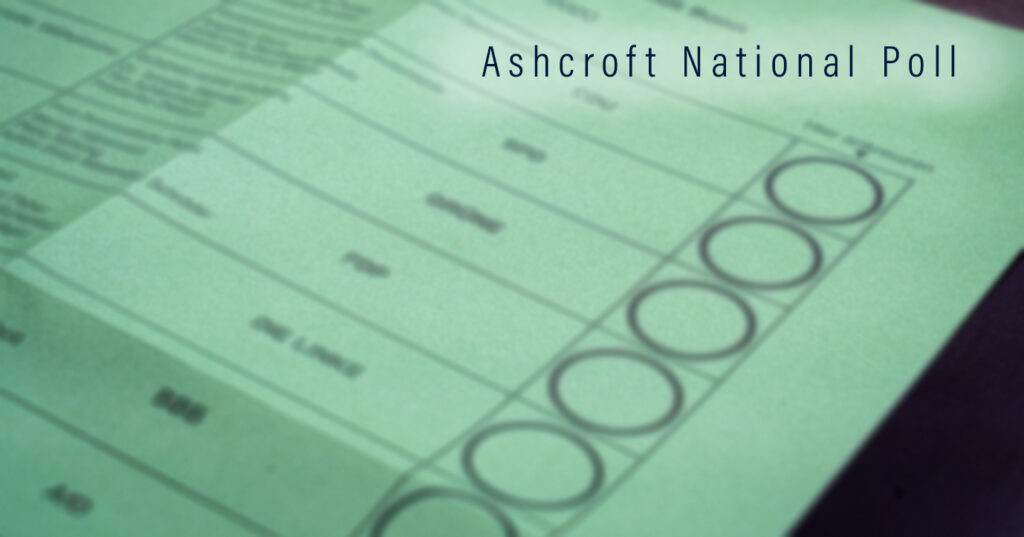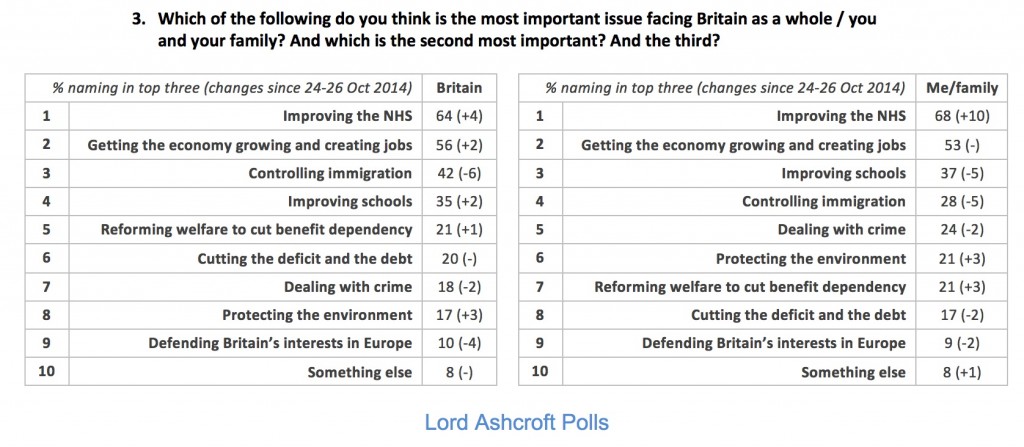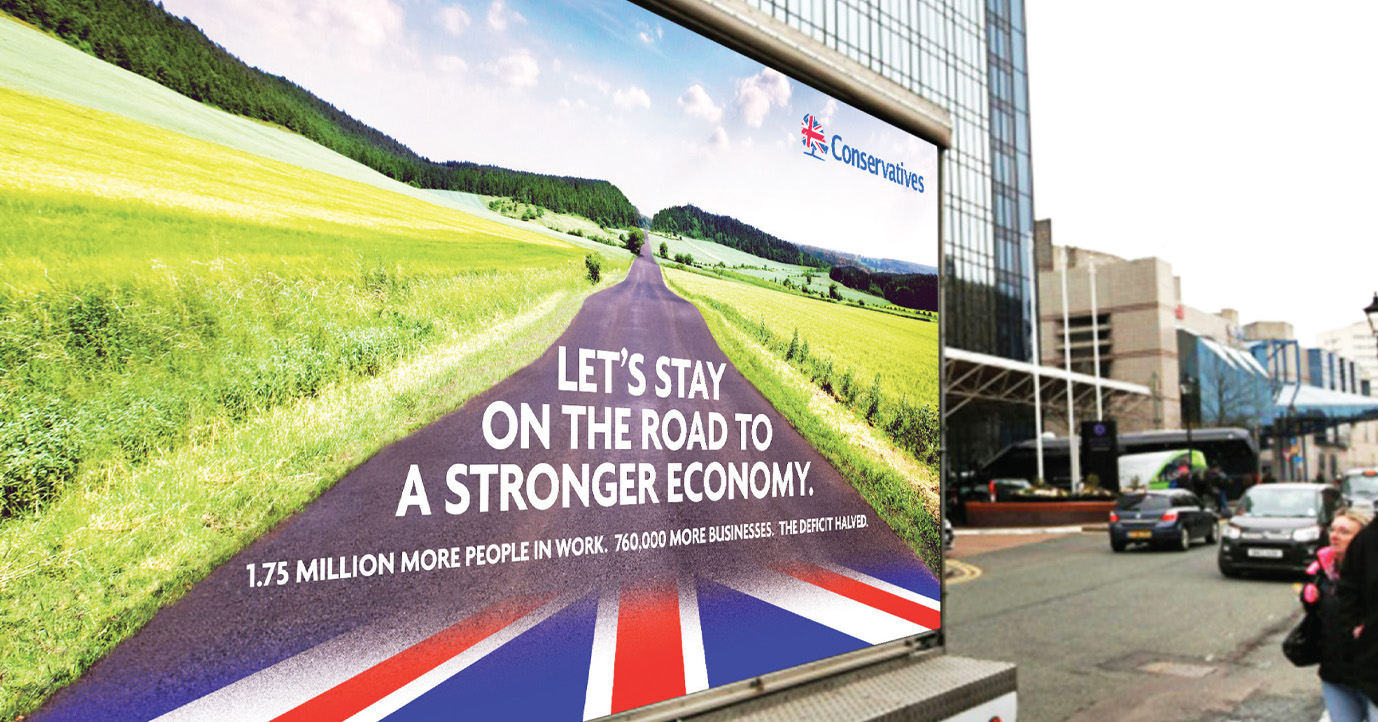
The Conservatives’ lead is down from four points to two in this week’s Ashcroft National Poll, which shows a lower vote share for both main parties. The Tories are down three points to 31%, with Labour down one at 29%, UKIP unchanged at 15%, the Liberal Democrats up three at 8%, and the Greens and the SNP unchanged at 8% and 5% respectively. All changes are within the margin of error.
The NHS once again topped the list of the most important issues facing both Britain as a whole and “me and my family”. Nearly two thirds (64%) said improving the NHS was one of the three most important issues facing the country, up four points since last October, and an increase of a total of ten points since last June. “Getting the economy growing and creating jobs” was chosen by 56% for the country and 53% for “me and my family”, while the proportion mentioning immigration was down six points to 42% for Britain as a whole, and down five to 28% for voters personally – putting it in fourth place on this measure behind “improving schools”.
Women were more likely to mention the NHS as an issue for the country (71%, compared to 57% of men), and for their families (71% again, though rising to 65% of men). They were also more likely to name schools, while a higher proportion of men than women mentioned the economy and immigration. More than three quarters (76%) of Labour voters mentioned the NHS, compared to 56% of Conservatives (rising to 64% when asked about themselves and their family). Meanwhile , 78% of UKIP voters mentioned immigration, compared to 45% of Tories, 37% of Labour voters and 21% of Lib Dems. Conservative voters were the most likely to name “cutting the deficit and the debt” (31%), compared to 20% of voters as a whole and 12% of Labour supporters.
The proportion of voters saying they most trusted Ed Miliband and Ed Balls to manage the economy was unchanged at 26% since I last asked the question in October. This put them 17 points behind David Cameron and George Osborne, down two points at 43%. Just over one fifth (21%) of Labour voters said they trusted Cameron and Osborne more than Miliband and Balls, and swing voters most trusted the Tory team by 49% to 20%.
********
This week’s focus groups with undecided voters took place in Northampton and Cardiff. Campaigning is evidently well underway in both locations, with most participants having received direct mail and leaflets or spotted items on Facebook, increasingly used as a campaigning tool and source of news. The Cardiff groups reported that Conservative candidate Craig Williams has alighted on a novel way of getting people to read his letters, apparently addressing them as “Dear Lovely Resident”. It made them smile, which is a good start.
********
As far as our groups were concerned the most prominent election news story was still “this incessant thing about debates”. The most politically engaged participants were not surprisingly the most put out at the prospect of being denied the spectacle, and those who already took a dim view of David Cameron saw his position as part of a pattern of behaviour: “He has got more arrogant as time has gone on, and the debates are proof”. But from others, there were signs that the mood was moving from indifference to annoyance that more important issues were not being discussed: “It’s just hyped up by the media. What about the rest of the country and what’s happening?” People also felt they were unlikely to learn much if debates went ahead, particularly if all seven leaders took part: “It would be an act, like Prime Minister’s Questions, a shouting contest. They never answer the question, just tell you what you want to hear, then let you down anyway.”
**********
Labour’s claims that a new Conservative government would make £70 billion of cuts, resulting in “catastrophic” reductions in services and the smallest army since Cromwell, had registered with some participants. Even those who had had enough of austerity thought this sounded a bit on the hyperbolic side, making Labour’s charge less believable rather than more devastating: “I can’t believe they would seriously compromise the safety of the country. I can’t believe they would be stupid enough.”
In Cardiff, discussion if austerity led to the question of the NHS in Wales, which most agreed was in trouble. Though they realised responsibility for health was devolved, few thought the Labour-run Welsh Government was mainly to blame, since decisions about funding must surely be made in London: “Who has the final say? It’s the money, isn’t it?”
**********
Some in the groups had seen the Conservative poster featuring a tiny Ed Miliband tucked into Alex Salmond’s jacket pocket. It raised a chuckle and a few agreed that it would be a terrible thing for the SNP to be calling the shots at Westminster (“there would be another farcical independence vote. You’ve made your decision, get on with it.”) But most were unmoved by the argument – after all, what were they supposed to do about it? If they wanted Labour in government they would vote Labour, and if they didn’t, they wouldn’t – they could not affect the shape of any coalition once their ballots were cast: “It’s going to be messy whatever happens”.
**********
For some in our groups the Conservatives were beyond consideration (“I’ve had four years of pay cuts and I’m losing benefits”) and they were in two minds between Labour and UKIP. Those still weighing the Tories up tended to think Cameron was the most convincing leader (“he hasn’t knackered things up any further than they already were, so credit for that”) but wanted to know what they would do on immigration, the NHS, ensuring corporations paid their fair share in tax. They were depressed by the prospect of perpetual austerity (“what sort of state is the country in if we can’t afford lollypop ladies?”) and wanted a reason to believe that if the economy was recovering things would be better for them, not just other people: “The cinemas are packed and people are out and about, but for the people I speak to life is getting harder. Shopping has gone through the roof… We need to see the reward in things like pay.”
Some were also doubtful about the idea of re-electing the Conservatives to “finish the job”: “How can you finish the job of running the country? Are they suddenly going to say ‘there, we’ve finished’ and disappear down the pub?”
**********
On the whole people were glad to have UKIP around to stir things up. But some were worried about a “racist undertone” and wanted reassuring that “the atrocious things some of their people come out with” did not give a true picture of the party. Interestingly, a number of participants said their school-age children had been horrified to hear they were even considering UKIP: “My eleven year-old son said ‘you can’t vote that, that’s racist’”; “My boy is mixed race. He just looked at me in astonishment.” There was also the familiar concern that “we need to look at the whole manifesto but that’s the problem with UKIP, they haven’t got one.”
Even so, Nigel Farage had more admirers than detractors. Though a few thought he was “along for the ride, to make a name for himself”, more thought he was the most honest politician of the time: “He even said he would never be PM because he would be rubbish at it. That was fantastic.” Others were in two minds: “He’s either an evil genius or a fairly normal bloke.”
**********
None of our participants was seriously considering the Liberal Democrats, even in Northampton where the party had come a very close third in 2010. “They’re not in the running. I voted for them last time because I thought they were like Labour used to be – a social moral conscience with a bit of common sense. But now… they’ve lost their purpose.”
**********
Labour seemed to lack a clear purpose and a credible plan, as well as a persuasive campaign (“Margaret Thatcher wouldn’t have been dicking around with a pink bus”, as a young primary school teacher and self-professed feminist put it). “They’re so staid. They need revamping.”
A few praised Ed Miliband for being “for the people” and against privatisation, or even thought he had in recent months become “stronger and more believable; more determined”. But for others who wanted to vote Labour he made it more difficult for them to do so: “He’s not a complete block but it’s not helping things”; “He doesn’t inspire confidence. In fact it frightens me, the idea of him being in charge.” Some also disliked what they saw as his political instincts: “He wants to appeal to the lowest common denominator. If someone gets something because they work hard, he wants to take it off them and give it to someone else.”
Still, in terms of background and personal experience, people thought there was little to choose between the three established party leaders: “They’re all Oxford types anyway.” For them, this divide between the millionaire insider and the ordinary voter was more significant than any political distinction between the three. And this was before news had emerged that the Milibands possessed a greater than average number of kitchens.
**********
Despite this, if each of the leaders found themselves with the unexpected luxury of a free Friday night they would not necessarily all spend it in the same way, according to our groups. Mr Farage would inevitably go to the pub, possibly after a spot of fishing, or, for the cynics, “to a French restaurant with his German wife to complain about immigration”. Mr Clegg, a likeable “family man”, would take his wife and children ten-pin bowling, or stay in with them to watch Bake Off. Mr Miliband, if he did not have a “posh dinner party” planned, would be playing with the train set some suspect he has in his loft, or spend the time “reading the opinion polls for something to grab onto” (though the disparagers didn’t have much conviction here: of course he would make the most of extra time with his family). Mr Cameron, meanwhile, would “get a helicopter to Cornwall” with Sam and the kids, where he would take the country air to help him focus on the job. Should the family be away, however, he would go “to his club” to engage in “mildly inappropriate banter with Conservative MPs and eight bottles of Cabernet Sauvignon.”




